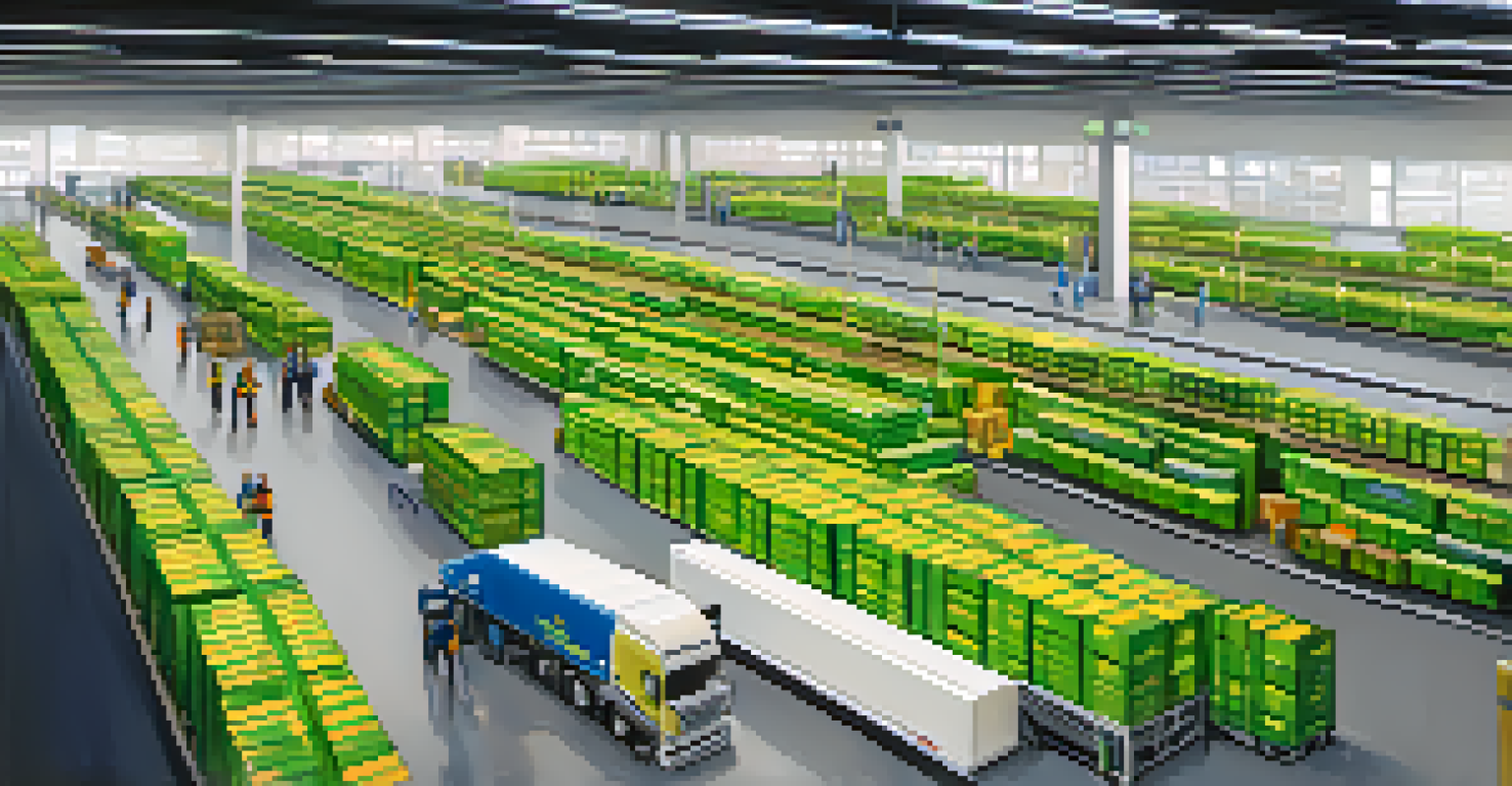Impact of Marijuana Legalization on Global Supply Chains

Understanding Marijuana Legalization and Its Context
Marijuana legalization refers to the process of removing legal prohibitions against cannabis use and trade. This movement has gained momentum in various countries, reflecting changing societal attitudes towards the drug. As nations embrace legalization, its implications ripple through multiple sectors, including agriculture, healthcare, and commerce.
The legalization of marijuana is not just about the drug itself, but about the societal shifts and economic opportunities it brings.
Legalization can differ from one region to another, with some areas allowing recreational use while others permit only medicinal applications. This creates a patchwork of regulations that businesses must navigate, adding complexity to the supply chain. Understanding these nuances is vital for stakeholders looking to engage in the global marijuana market.
As we explore the impact of legalization, it's essential to consider both the opportunities it presents and the challenges it poses. These dynamics significantly influence how marijuana is cultivated, processed, and distributed worldwide, shaping the contours of the global supply chain.
Impact on Agricultural Supply Chains
The agricultural sector is directly affected by marijuana legalization, as it opens up new avenues for farmers. Cultivating cannabis can be more profitable than traditional crops, leading to a shift in agricultural practices. As farmers transition to cannabis production, they must adapt their methods to meet specific regulatory requirements and market demands.

Additionally, this shift can create a ripple effect in local economies, as ancillary businesses like equipment suppliers, fertilizers, and labor services see increased demand. For instance, farmers might require specialized tools or organic fertilizers to ensure compliance with legal standards, thus affecting the entire supply chain.
Economic Growth from Legalization
Marijuana legalization creates jobs and generates tax revenue, benefiting local economies and funding public services.
However, the agricultural landscape also faces challenges such as competition for resources like water and land. As marijuana cultivation expands, balancing these demands with other agricultural needs becomes crucial for sustainable practices.
Logistics and Distribution Challenges
With marijuana legalization, the logistics of transporting cannabis products become increasingly complex. Companies must navigate a web of regulations that vary by jurisdiction, which can complicate distribution routes. This complexity requires innovative solutions to ensure compliance while maintaining efficiency in the supply chain.
When we legalize marijuana, we create a new industry that provides jobs, generates tax revenue, and helps to reduce crime.
Furthermore, the presence of state and international borders adds another layer of complexity. Companies engaged in cross-border trade must be acutely aware of differing laws, which can hinder logistical planning and execution. For example, a product legal in one state might face severe penalties if transported to another where cannabis remains illegal.
Ultimately, businesses must invest in robust logistical frameworks that can adapt to the evolving landscape of marijuana laws. This can involve developing strong partnerships with local distributors and investing in technology to streamline compliance and tracking.
Economic Opportunities Created by Legalization
Marijuana legalization presents significant economic opportunities, from job creation to increased tax revenues. As the industry grows, new roles emerge in cultivation, distribution, and retail, helping to lower unemployment rates in various regions. This influx of jobs can invigorate local communities and stimulate economic growth.
Moreover, tax revenues generated from legalized cannabis sales can fund public services such as education, healthcare, and infrastructure. For instance, states like Colorado have seen considerable boosts to their budgets since legalization, allowing for reinvestment in community initiatives.
Complex Supply Chain Challenges
Navigating the varying regulations across regions complicates the logistics of marijuana distribution, requiring innovative solutions.
However, the economic benefits are not evenly distributed. Regions that embrace legalization may flourish, while those that hesitate could miss out on potential growth. This disparity highlights the importance of strategic planning and policy development in maximizing economic opportunities in the cannabis sector.
Social Implications and Consumer Behavior
The legalization of marijuana also brings about notable social changes, influencing consumer behavior and perceptions. As societal stigma around cannabis diminishes, more individuals are willing to explore its uses, both recreationally and medicinally. This shift can lead to increased demand, affecting how products are marketed and sold.
For example, consumers are becoming more discerning, seeking high-quality, organic products, which in turn influences cultivation methods and supply chain practices. Businesses must adapt to these changing preferences to remain competitive, leading to innovations in product offerings and service delivery.
Additionally, education plays a key role in shaping consumer behavior. As more information becomes available about the benefits and risks of marijuana use, consumers are better equipped to make informed choices, further transforming the landscape of the cannabis market.
Global Trade Dynamics and Marijuana
Legalization varies globally, creating a complex landscape for international trade in marijuana. Countries that embrace legalization may find themselves at odds with those that maintain strict prohibitions, complicating cross-border commerce. This divergence can lead to unique trade dynamics as businesses seek to navigate the global market.
For instance, Canada’s nationwide legalization has positioned it as a leader in the global cannabis market, while countries with more restrictive laws miss potential economic benefits. This situation can create opportunities for businesses willing to engage in compliant international trade practices.
Environmental Sustainability Needed
As cannabis cultivation expands, sustainable practices are crucial to mitigate environmental impacts and ensure long-term viability.
However, the potential for trade is tempered by regulatory hurdles and varying quality standards across borders. Companies looking to export must ensure adherence to both their home country's laws and those of their target market, which can create significant challenges in supply chain management.
Environmental Considerations in Cannabis Production
The environmental impact of cannabis cultivation cannot be overlooked, particularly as legalization expands. Increased demand for marijuana can lead to intensive agricultural practices that strain natural resources, including water and soil. As a result, sustainable practices become essential for mitigating environmental damage.
For example, some cultivators are turning to organic farming methods and water conservation techniques to minimize their ecological footprint. These initiatives not only help preserve the environment but also appeal to environmentally-conscious consumers, enhancing brand reputation.

However, the challenge lies in balancing productivity with sustainability. As the industry grows, it’s crucial for stakeholders to prioritize eco-friendly practices that ensure long-term viability for both the business and the planet.
Future Trends in the Marijuana Supply Chain
As marijuana legalization continues to evolve, several trends are likely to shape the future of its supply chain. One significant trend is the increasing adoption of technology, such as blockchain, to enhance transparency and traceability in cannabis transactions. This technology can help build consumer trust and ensure compliance with regulations.
Additionally, we may see a rise in vertical integration, where companies control multiple stages of production and distribution. This approach can streamline operations and improve efficiency, allowing businesses to respond more quickly to market demands.
Economic Growth from Legalization
Marijuana legalization generates significant economic opportunities, including job creation and increased tax revenues for public services.
Ultimately, the future of the marijuana supply chain will be influenced by ongoing legislative changes, consumer preferences, and technological advancements. Stakeholders must stay agile and informed to navigate this rapidly changing landscape successfully.